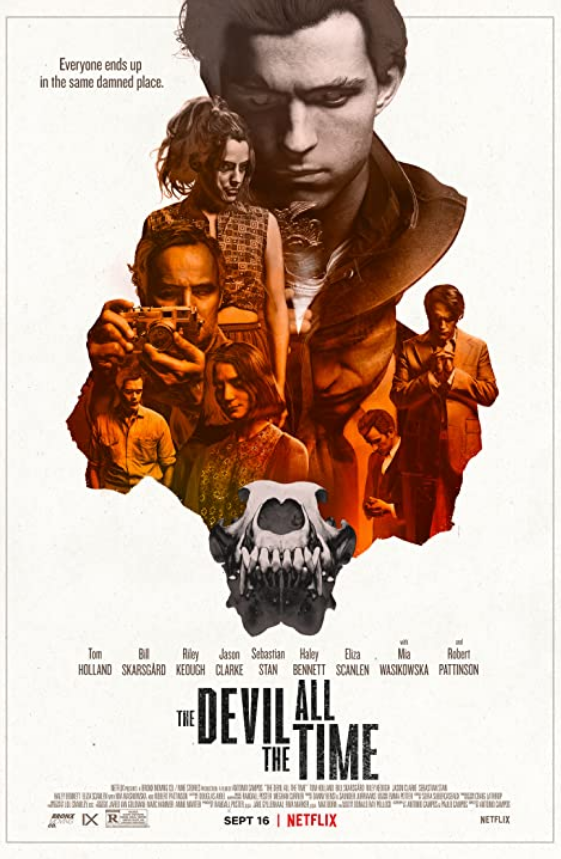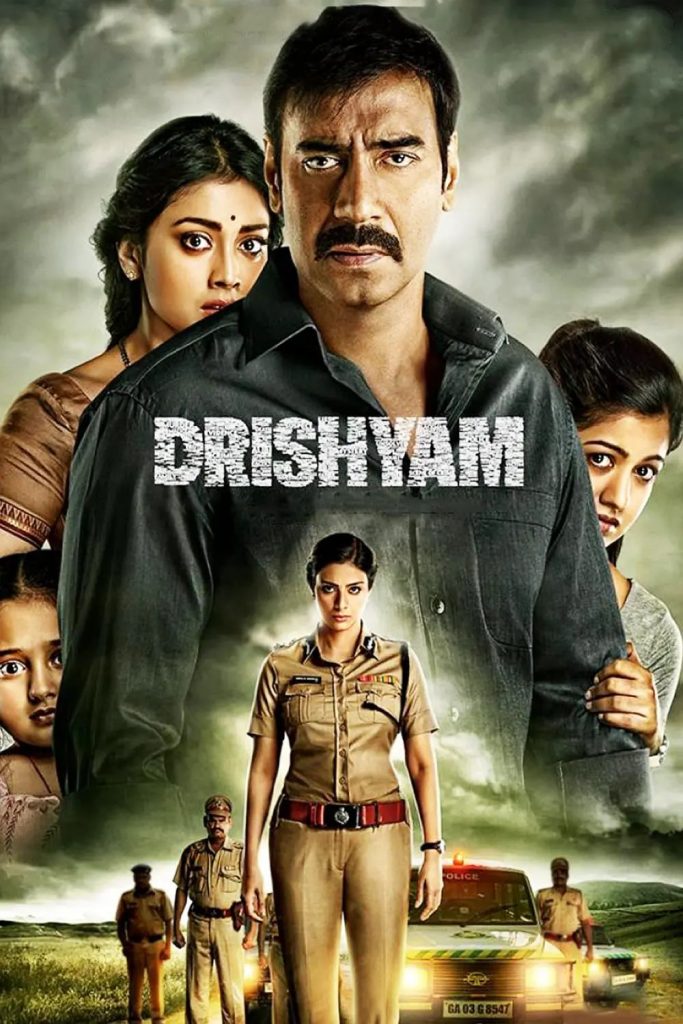The film is based on a novel published in 2011 by American author Donald Ray Pollock. The title suggests that this is not a commercial blockbuster with entertainment elements, but a crime film with a religious dimension. The main character is Yavin, played by “Dutchy”, but the story begins with his father Willard.
In the 1940s, at the end of World War II, young Willard returned home from the war to a small town with a strong Christian faith. His mother had promised God that if her son returned alive, he would marry Helen, a devout neighbourhood girl. However, Willard had seen too much sin and death on the battlefield and had long resisted God. So he ran away to a neighbouring town, married another girl, had a son, Arwen, and settled there.
As outsiders, the family was ostracised, Yavin was bullied at school and he and his wife were not allowed to attend church. For the safety of his wife and son, Willard returned to his faith, erecting a cross in the woods behind the house and taking Yavin with him to pray regularly. But God didn’t seem to listen and it wasn’t long before his wife developed cancer. Willard prayed frantically with his son and even killed his beloved dog as a sacrifice. But God still hadn’t shown up, and his wife soon became ill and died. Willard was so distraught that he killed himself in front of the cross, leaving 10-year-old Yavin an orphan.
On the other hand, tragedy struck Helen, whom Willard did not marry. She married a priest, who was unexpectedly a religious fanatic. One day, under the pretext of going out for a drive, the priest took Helen into the grove and murdered her. He thought he had received a “resurrection” from God, so he killed his wife to experiment. But as you can imagine, God failed again and Helen could not be resurrected.
The priest absconds and is killed halfway by a serial killer couple. Thus, their daughter Lenora is also orphaned and has been raised by Willard’s mother. After Willard’s death, Yavin was sent to his grandmother’s house by the police and became brother and sister with Lenora. A few years later, the two grew up. On Yavin’s 17th birthday, he receives a mysterious birthday present, a gun left to him by his father. Lenora, on the other hand, like her mother Helen, became a devout Christian. Although often teased and bullied by the boys, she is very strong in her faith and visits her mother’s grave every day to read from the Bible and drop in for church prayers.
Yavin loved Lenora as if she were his own sister. As a result, he had long had a hard time with the bad boys who bullied his sister. He saw his chance and gave them a good beating with the “three keys”. After that, Lenora was never bullied at school again. But at the same time, an unseen danger was looming. There’s a new priest in the church, and he’s not a good one, as you can tell by the wicked way he preaches.
Neil, is that you? This priest regularly brainwashes girls in the name of God and then violates them. The innocent and clueless Lenora, too, fell prey to him. And all this, unbeknownst to Yavin. It wasn’t long before Lenora found out she was pregnant, but instead of admitting it, the priest brainwashed her that it was all an illusion. Regretful, Lenora chose to commit suicide with shame and guilt. By the time Yavin found out, it was too late. At the funeral, the priest did not turn up for the customary prayer, which made Yavin suspicious. Later, when the coroner discovered that Lenora was pregnant, Yavin became even more suspicious of the priest.
After some time of following up, he finally discovers the priest’s ugly deeds. It is easy to see that this is a film with a thoroughly anti-religious and anti-Christian theme. The original English title of the film, “The Devil All The Time”, means that the devil is everywhere and God is nowhere to be found. The devout Christians are left with broken families and orphans who continue to repeat the mistakes of their fathers.
The priests who come and go are all morally correct, either madmen who have gone off the deep end or perverts who do demonic things in the name of God. And this is just the tip of the iceberg of this sinful town. It is, in fact, a multi-perspective, cross-narrative group film, and the real protagonist is not Yarvin, but the omnipresent evil in the town.
The film also devotes a lot of space to two other groups of criminals. One of them is the sheriff who sends Yavin back to his grandmother’s house. He is in cahoots with the local gentry and bullies and controls all the bars, restaurants and brothels in the town. Then, in a desperate bid to run for mayor, the sheriff wants to get rid of the “bad guys” and kills them. Since then, he has had no choice but to take over the town.
The other villains are Carl and Sandy, the murderous couple who killed Lenora’s father. Their modus operandi is to drive around and prey on stranded male passers-by. Sandy used her beauty to lure them into intercourse, while Carl watched and took photographs. After the photo shoot, the two men would brutally kill their target and move on to their next prey.
Counting from the lunatic priest, they have unwittingly mutilated dozens of lives. When he discovered the truth about his sister’s murder, he didn’t hesitate to run to the church and kill the psychopathic priest with the gun his father had left behind. However, on the run, he gets into the car of the murderous couple …… and the two story lines converge. But the alert Yavin senses what’s going on and kills Carl and Sandy first.
But to his surprise, Sandy is the sister of the sheriff. In the end, Yavin comes to the woods where he and his father prayed together as children, and the sheriff tracks them down. The two will play the ultimate showdown …… as the Sheriff happens to be the “Winter Soldier”, the film has been teased by netizens as “Spider-Man vs Batman & Winter Soldier”. The Devil All the Time is a serious, realistic crime thriller with dark elements.
On the surface, the film is a clear criticism of God and religion, but in essence, it is an anti-religious story that exposes and criticizes the sinfulness and greed of human nature. It is not so much a “godforsaken place” as it is a place of sin, hatred, war and killing.
From the father who fought in the war to the gun-toting Yavin, from Helen who was murdered by the priest’s husband to Lenora who was killed by the priest, from the religiously fanatical one generation of priests to the evil and perverse second generation …… Neither the innocent, nor the pious, nor those who are themselves guilty of the worst sins have escaped the ravages of sin. The dark setting of the all-villain shows that sin is an ignorant instinct from which mankind can never escape. For this reason, the film has many intriguing strengths in terms of storytelling and thematic expression.
The interlocking and interwoven multi-layered narrative is reminiscent of the Coen brothers’ No Country for Old Men, and the biting satire on Christianity is reminiscent of Blood Will Tell. However, the film’s shortcomings are equally striking.
On the one hand, the narration, which is pervasive throughout, seems to be an official interpretation to “take care of the audience”, which is not only superfluous but also undermines the visual narrative. On the other hand, the long span of time and the complex relationships between the characters undermine the dramatic tension to a certain extent, so that for the most part the film feels like a loose and drawn-out drama. Fortunately, the performances of the leads add to the film.
The most striking performance is that of Robert Pattinson, the “new Batman”, who has been making a lot of noise lately. His demeanour and his deliberately strangled tone of voice portrayed the psychopathic priest with a human face. Dutchy, who has the most parts, also does an excellent job. There is not much room for characterisation, but his emotional levels are precise, from his initial timidity and cowardice, through his restrained stoicism in the middle of the play, to his final outburst.













